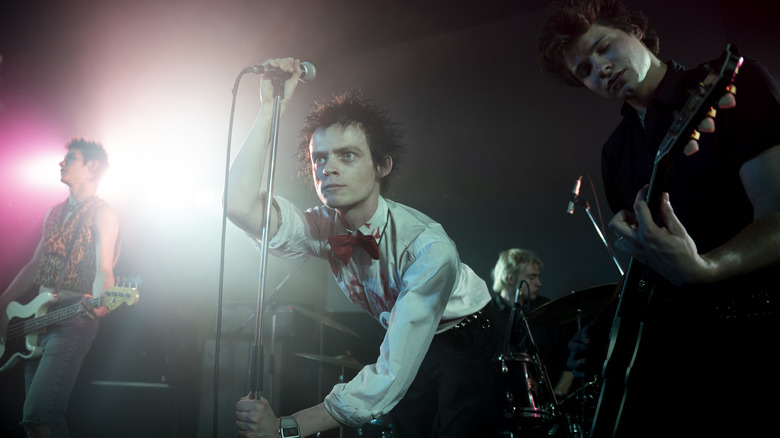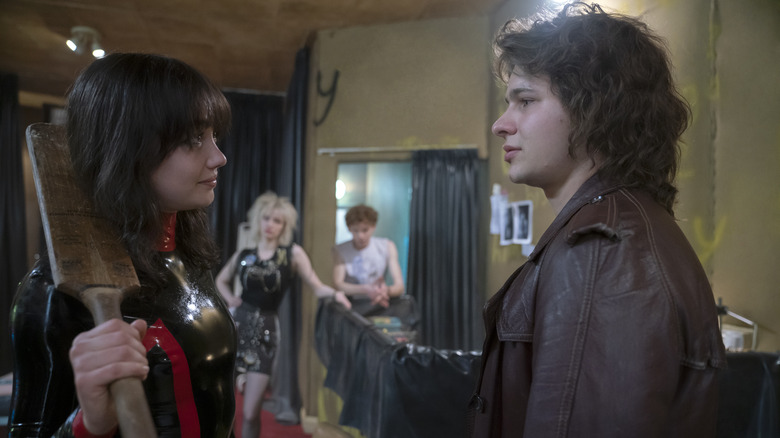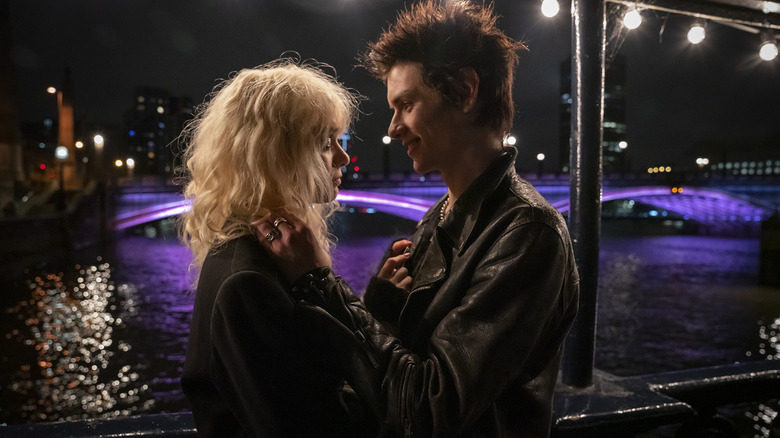Pistol Review: A Punk Rock Miniseries As Raw And Powerful As The Band That Inspired It
Music fans have argued for decades about the origin of punk music, with some claiming it began in New York City with the Ramones, while others claim it all began in London with the Sex Pistols. Though they both originated in the mid-1970s, it's impossible to deny the strong political statement of the Sex Pistols, whose songs were a primal scream against authority and commercialism. The Sex Pistols created a punk revolution in 1976 London that soon spread throughout the world, with an ethos that spits in the face of propriety and worships at the altar of anger. The band's lyrics pointed out the inequities of living in the U.K., and their hit "God Save the Queen" was banned by both the BBC and most independent radio stations, making it one of the most-banned songs in U.K. history. The wild ride of the Sex Pistols was over almost as soon as it began, however, as band in-fighting and rampant drug use led their chaos to become truly destructive. By the time bassist Sid Vicious was arrested for the murder of his girlfriend Nancy Spungen and then found dead himself a few months later in 1979, the band was already headed for the end.
The new FX limited series "Pistol" tells the rise and fall of the Sex Pistols, based largely on the memoir "Lonely Boy: Tales From a Sex Pistol" by founding member and guitarist Steve Jones. It follows Jones (played by Toby Wallace) as he forms his band with the help of manager Malcolm McLaren (Thomas Brodie-Sangster) and counter-culture fashion icon Vivienne Westwood (Talulah Riley). He soon teams up with John Lydon (Anson Boon), who changes his name to Johnny Rotten and becomes the band's explosive lead singer. Paul Cook (Jacob Slater) is their hardworking drummer, and Glen Matlock (Christian Lees) is the original bass guitarist who doesn't quite fit the Pistols' look and is replaced by Rotten's old friend, Sid Vicious (Louis Partridge). The who's-who of the 1970s London punk scene are all here, including The Pretenders' lead singer and guitarist Chrissie Hynde (Sydney Chandler), fashion and punk political protester Jordan (Maisie Williams), and New York groupie-slash-heroin-hookup Nancy Spungen (Emma Appleton).
The six-episode limited series is directed by Danny Boyle, who more than proved he understands the punk ethos with his seminal 1996 film "Trainspotting." The series was created by Craig Pearce, best known for his work creating "Romeo + Juliet" and "Moulin Rouge!" with director Baz Luhrman. "Pistol" is a wildly kinetic, often brutal depiction of the three years of the Sex Pistol's reign, showcasing the highs and lows of leading the punk revolution. It's loud, chaotic, and extremely messy, just like the Pistols themselves. (It should be noted that Rotten tried to sue the other surviving members of the band, who are involved in the series, to not use the Pistol's music but a judge found in favor of the rest of the Pistols, so there are lots of great Sex Pistols music in the series and it's mostly approved by the band.)
Never mind the bollocks...
There's no shortage of great media digging into the debauchery of the Sex Pistols, like the 1986 biopic "Sid and Nancy" and the 2000 documentary "The Filth and the Fury," but this is the first time the story has felt truly personal or relatable. By following Jones, one of the less rambunctious members of the band, the audience is provided a window into this wild world. Wallace plays him with a kind of tortured boy-next-door vibe, a surprisingly sensitive lad despite his Jim Morrison-esque coif and tendency to wear lots of leather. He develops a close friendship with Hynde when she teaches him how to be better at guitar, and Wallace and Chandler have killer chemistry that's especially evident when their friendship turns into something more. Chandler in particular is a standout as Hynde, who serves as one of the anchors that the chaotic Pistols swirl around. There are plenty of opportunities to reduce the women of this story to tropes, and thankfully the series doesn't do that. They are each complex, nuanced individuals, just like their male counterparts. Even Spungen has moments of depth, something rarely afforded her in other retellings that only show her at her most depraved.
The series progresses chronologically, for the most part, starting with the formation of the band and Jones' introduction to McLaren, Westwood, and the rest of the SEX crew. SEX was Westwood and McLaren's punk fetish boutique, offering latex and leather clothes that would give the Queen a sheer heart attack. Westwood would go on to be a world-recognized fashion designer, but when she was lending her outfits to the Pistols and their groupies in order to get them seen, she was still just beginning her career. When everyone's just starting out, there's a whimsical quality to the series, as if it's a coming-of-age story told through the greasy lens of punk rock.
There are moments where the horrific reality of being poor and disenfranchised in 1970s England becomes all too real, though, reminding the audience that the controversial lyrics and provocative outfits mean something. A powerful subplot follows Pauline (Bianca Stephens), a young woman who was raped by one of the staff in a mental institution and then forced to have an abortion. She becomes the inspiration for the Sex Pistol's song "Bodies," and her interactions with the various counter-culture characters give us great insight into who they really are, while also showing the true depths of disenfranchisement in the U.K. Pauline and Rotten have a kind of beautiful friendship, and the way the two highlight the full spectrum of poverty and mistreatment by the system is brilliant.
The performances really sell the characters, especially in their more extreme moments. Everyone gives it their all, though Boon steals every scene he's in as the near-feral Johnny Rotten. He's a spark plug, a lightning strike, a bolt of pure energy delivered unto the world to shake it up and tell us all what's what. Though many people only know Rotten through his on-stage persona and performances, where he's a spitting, fighting maniac, the series shows him with a softer side, too. He's angry because he gives a damn, and that empathy is what makes the music matter.
No future for me
One thing that's important to remember about the rise and fall of the Sex Pistols is that most of the band members were rather young. Vicious was only 21 when he died, and the rest of the band were similarly in their early twenties. They were barely young adults, fresh out of adolescence and trying to survive in a real meat-grinder of a world. It's no wonder that several members turned to drugs and alcohol to chase away their pain, though the series wisely doesn't glorify these moments. Some of the early partying is depicted as simply youthful exploration and celebration, but once the drugs and alcohol become an escape, the tone changes drastically. The hopelessness of being poor and uneducated really starts to set in, even among these infamous rock stars.
The romance between Sid and Nancy is one of the most well-known parts of the Pistols' story, a tragic love that feels ripped from Shakespeare. The series handles it delicately, portraying them as two lost souls who found one another, for better and worse. Because Nancy's murder was never solved, the series guesses at what actually happened based on the testimony of other band members and a hotel clerk, and it paints Sid in a fairly sympathetic light. Nancy is also sympathetic, a deeply damaged young woman that decided to fight back. One moment where Nancy thanks Hynde for being the first person to ever show her kindness is heart-wrenching, especially when we know how it all ends.
What's especially impressive is that on top of depicting these larger-than-life characters in ways that actually feel relatable, the series is so steeped in punk rock aesthetics that it feels like stepping sideways through time. Boyle and his team have recreated the look and feel of the late 1970s and early 1980s not only through costuming and production design, but through cinematography as well. There are lots of bold cuts, awkward angles, and film effects that make the footage look older and dirtier. This isn't a simple noise filter, but feels baked in from the start. The music also feels as if it were considered from the very beginning, and there aren't any weird or unnecessary needle drops, just some great concert recreation footage and some neat compilations of the fictional version of the band alongside archival footage of the real thing.
"Pistol" is a feral scream against the establishment that feels timely despite being about events that took place more than 40 years ago. Some things change, but apparently, the need for punk remains the same. The series ends on a surprisingly hopeful note, given the tragedy of it all, and it's a great reminder that rebellion is something that starts inside of us all. Never mind the bollocks, and make sure to check out "Pistol" when all six episodes drop on Hulu on May 31, 2022.
/Film Rating: 9 out of 10
"Pistol" premieres Tuesday, May 31, 2022, with a full season drop on Hulu.


